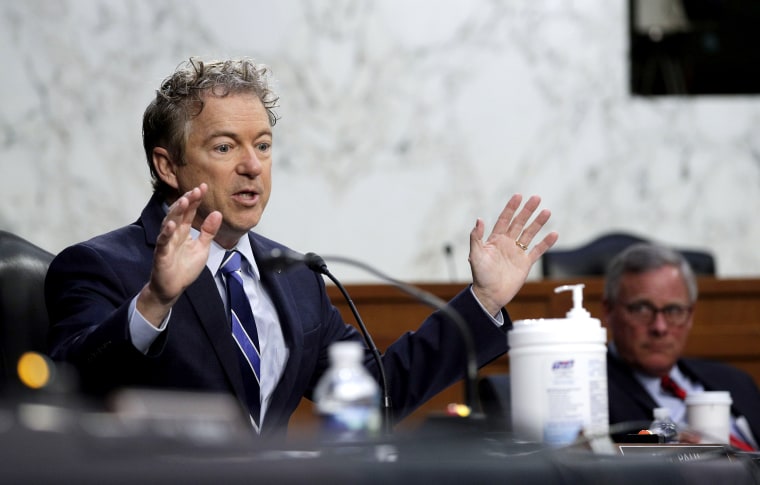When the Senate Health, Education, Labor and Pensions (HELP) Committee announced that Dr. Anthony Fauci would offer testimony on the COVID-19 pandemic, an obvious question came to mind: what kind of unfortunate questions would Sen. Rand Paul (R-Ky.) ask this time?
As TPM noted, the Kentucky Republican was especially interested yesterday in the origins of the virus.
During a Senate hearing on the COVID-19 response, Paul accused the National Institutes of Health (NIH) of sending funds to its lab in Wuhan, China to "juice up" a virus originally found in bats to produce a supervirus that can infect humans. Paul, who was the first senator to test positive for COVID-19 last year, asked Fauci repeatedly about a theory that suggests the coronavirus started in a Wuhan research lab before somehow escaping — which has circulated within right-wing and conspiracy theory sites for months.
Indeed, Rand Paul appeared to be echoing a theory pushed the night before on Fox News, which seemed to indirectly implicate Fauci in the crisis.
A Washington Post analysis added that the NIH's work with a Chinese lab ran afoul of a prohibition on "gain-of-function" research, which involves "altering genomes to give viruses new properties, such as the ability to infect a new host species or to transmit more easily. The idea behind such research is that it might provide insight into how a virus spreads and improve efforts to counteract it, though it also carries obvious risks, which is why funding for such research is limited."
It fell to Fauci to once again try to explain reality to the Kentucky Republican. "Senator Paul, with all due respect, you are entirely, entirely and completely incorrect," Fauci said. "The NIH has not ever, and does not now, fund 'gain of function research' in the Wuhan Institute."
Fauci added that he is "fully in favor of any further investigation of what went on in China," but rejected the GOP senator's suggestion that the NIH was somehow complicit in funding dangerous gain-of-function research in Wuhan.
Or put another way, Fauci explained that Paul didn't know what he was talking about.
If this sounds familiar, it's because yesterday's back and forth was the latest in a series. As regular readers know, Rand Paul keeps doing this, apparently under the impression that there's some value to the pointless exercises.
Round 1: In May 2020, Paul lectured Fauci about "people on the other side who are saying there's not going to be a surge" in coronavirus cases, so "we can safely open the economy." The second of three infection spikes soon followed.
Round 2: In June 2020, Paul complained that Fauci's public-health assessments were downers --"All I hear is, 'We can't do this', 'We can't do that'" -- and the crisis would ease with more upbeat rhetoric. "We just need more optimism," the Republican declared.
Round 3: In September 2020, in a tense back and forth, Paul tried to convince Fauci that New York had already reached herd immunity, which was amazingly foolish, even for him.
Round 4: In March 2021, the senator complained bitterly about public health experts recommending mask-wearing, including for those who've already been infected, calling it "theater." Fauci responded by offering a lesson on variants and evidence.
Round 5 was yesterday.
Circling back to our earlier coverage, the overarching problem appears to be relatively straightforward: the former ophthalmologist genuinely seems to believe that he has unique and valuable insights, which frees him to reject the assessments of actual experts.
It was exactly one year ago today, for example, when Rand Paul told reporters that mitigation efforts in New York were not especially effective in saving lives -- "I think New York would have lost about the same amount of people whether they did anything or not," he said -- before arguing that the crisis has been "relatively benign" outside of "New England." (The senator isn't great at geography, either.)
Is it any wonder that Anthony Fauci seems a little exasperated with Rand Paul?

